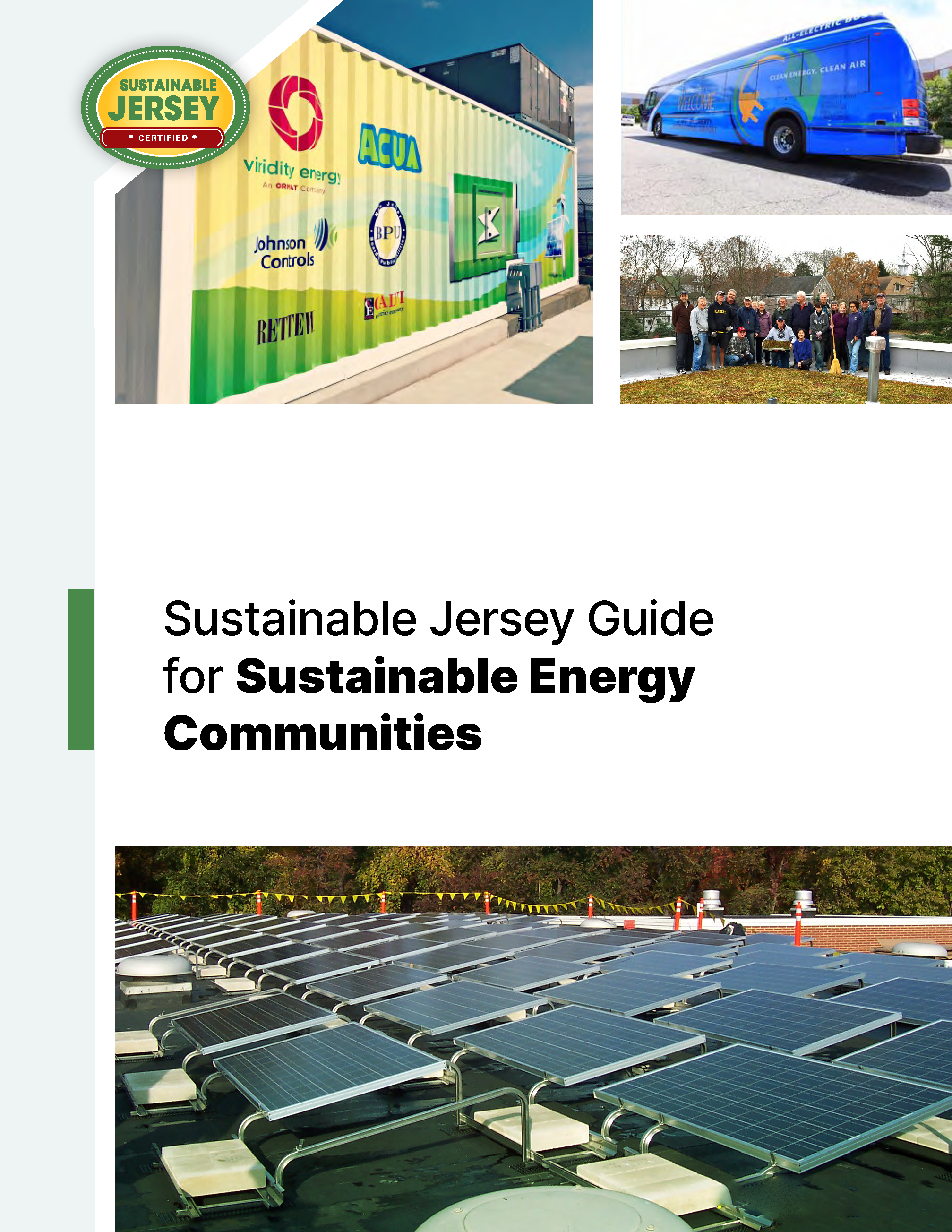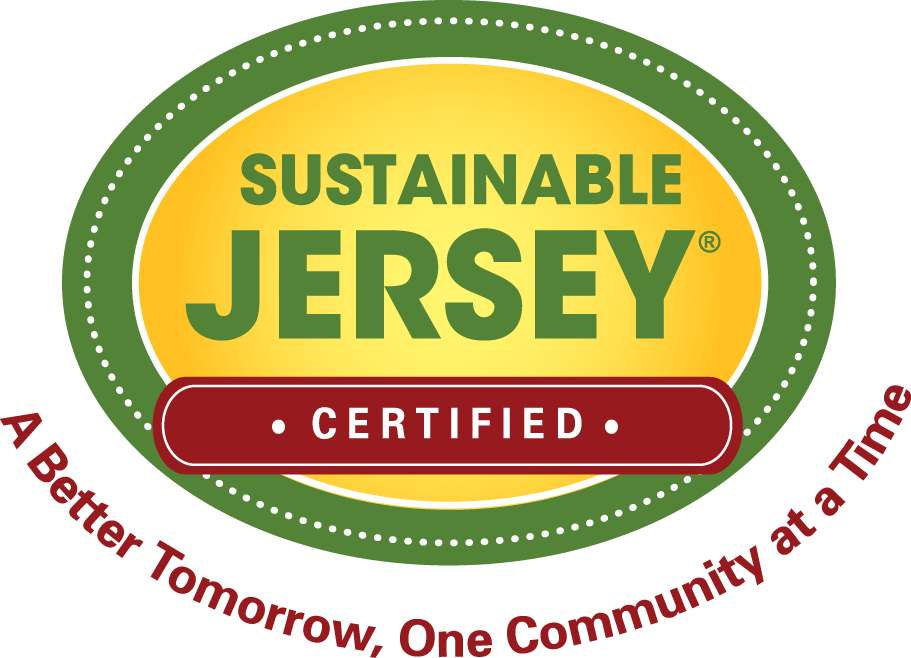Energy Guidebooks, Toolkits & Other Publications
The Energy publications consist of guidebooks and other publications. Publications are listed chronologically within each section with the most recent publications first. Navigate to the different data resources using the links below.
Energy Guidebooks & Toolkits
- Community Energy Planning Resources
- Model Community Energy Plan
- Sustainable Jersey Guide for Sustainable Energy Communities
- Community Energy Plan Workplan Template
- Community Solar Guidebook
- Community Solar Resource Page
- Alternative Fuel Vehicle Procurement Guide
- Renewable Government Energy Aggregation:
Sustainable Jersey How-To-Guide - How to Implement an Energy Savings Improvement Plan:
Sustainable Jersey How-To-Guide
Other Publications
Energy Guidebooks & Toolkits
Community Energy Planning Resources
December 2023
Sustainable Jersey has a wide range of resources to support municipalities in completing community energy plans, including energy data for your municipality and template plans.
Community Energy Planning Resources
For more sustainability-related data and maps, visit our Data Center.
Model Community Energy Plan
July 2023
Sustainable Jersey has created a model Community Energy Plan (CEP) for municipalities participating in the New Jersey Board of Public Utilities’ Community Energy Grant Program. This model CEP was created using the Sustainable Jersey Community Energy Plan Workplan Template. Municipalities can customize 'cut and paste' sections from the model CEP into their plan; most of the municipal data resources included in the model CEP can be found on the Sustainable Jersey Data Resources page.
Model Community Energy Plan

Sustainable Jersey Guide for Sustainable Energy Communities
October 2021
The Sustainable Jersey Guide for Sustainable Energy Communities provides guidance on initiatives that municipalities can implement to help the state meet goals outlined in the New Jersey Energy Master Plan: Pathway to 2050 (EMP). Organized by the seven strategies of the EMP, the guide provides concrete examples of initiatives listed in the Community Energy Plan Workplan Template.
Community Energy Plan Workplan Template
October 2021
Community Energy Plans help municipalities organize to rapidly lower greenhouse gas emissions by reducing energy use and expanding sustainable energy production in the community. This template provides municipalities with an array of impactful initiatives to include in a Community Energy Plan and a format for determining the implementation details of these initiatives. Municipalities must use this template as part of New Jersey Board of Public Utilities’ Community Energy Plan Grant Program.
Community Solar Guidebook
January 2021
Community solar is a path for residents who cannot install solar panels on their own property to participate in both the environmental and cost-saving benefits of solar energy. This guidebook gives an overview of:
- New Jersey's Clean Energy Program Community Solar Energy Program
- Municipal roles in community solar projects
- Community benefits of community solar projects
- Case studies of community solar projects in New Jersey
- How subscribers to community solar projects save money on their electric bill
Community Solar Resource Page
A short-format guide to Sustainable Jersey's community solar resources.
Alternative Fuel Vehicle Procurement Guide
Updated March 2022
The Sustainable Jersey Alternative Fuel Vehicle Procurement Guide provides information and resources for municipalities and school districts looking to add alternative fuel vehicles (AFVs) to their fleets. This guide includes strategies for procuring alternative fuel fleet vehicles at the best pricing and with the least amount of staff time spent on procurement logistics. Procurement methods covered in this guide include fleet vehicle leasing; purchasing cooperatives and government purchasing contracts; direct purchase; and service contracting and shared services. The guide also includes information on funding and incentives for alternative fuel vehicles and electric vehicle charging stations.
Renewable Government Energy Aggregation: Sustainable Jersey How-To-Guide
August 2019
This guidebook, developed by Sustainable Jersey, gives an overview of the rules that govern Renewable Government Energy Aggregation (R-GEA) in New Jersey. R-GEA (also known as community choice aggregation) provides a mechanism to move large numbers of customers into renewable energy electricity products quickly, easily, and in a way that reduces costs. The guidebook details the step-by-step process of establishing an R-GEA, from selecting an energy consultant to building support for the project in the community.
How to Implement an Energy Savings Improvement Plan: Sustainable Jersey How-To-Guide
August 2019
This guidebook, developed by Sustainable Jersey and sponsored by the New Jersey Board of Public Utilities, explains the process from beginning to end in straight forward and easy-to-understand language. Case studies of successfully implemented ESIPs are included and an exhaustive list of resources are also provided to guide local government units successfully through the ESIP process.
Other Publications
New Jersey Energy Flow Model
June 2015
The New Jersey Energy Flow Model describes the use and flow of energy within the state. This document describes the results and methods used to construct the model that quantifies where all of New Jersey’s energy comes from, how it is used within different end-use segments, and all the connecting flows. This model provides a framework for quantifying the use of energy within the state at any point, based upon objectively available information.
This document provides a technical overview of the NJ Energy Flow Model, as implemented through a spreadsheet and associated visualization infographic (Version 4.5). Please refer to the infographic and spreadsheet for details referenced in this overview.
New Jersey Sustainable Energy Efficiency Demonstration Projects
May 2013
This project investigates what reductions in greenhouse gas (GHG) emissions are possible in small and medium municipalities. It offers lessons on how to establish a protocol for leadership in municipalities through state and federal support, and to share information on measures that reduce GHG emissions among residents and businesses.
